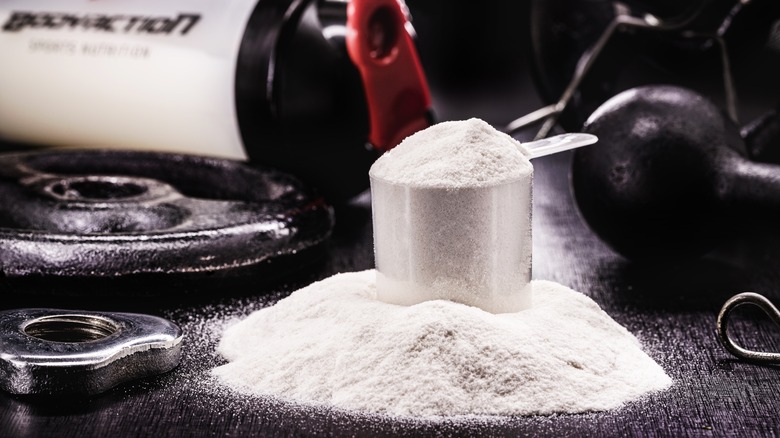What Happens If You Eat Expired Protein Powder
Protein powder is a hot topic in fitness circles. It's always a treat to head to the nearest fitness store and purchase a large bottle of whey or casein. Many health-minded people enjoy the delicious drink as part of an active lifestyle. After all, protein is a building block for your body. Everything from your organs, muscles, and tissues to your bones, skin, and hair require protein to be healthy.
For weightlifters or serious athletes, popular protein powder brands give them an extra push when it comes to muscle repair and building strength. But they're not the only ones who can benefit from protein. Some even like throwing protein powder into healthy smoothies each morning or cooking with it while making pancakes or cookies. One of the big concerns with protein powder, though, is finishing all of it in time. More often than not, you might be looking at a bottle, box, or carton that's passed its expiry date and wondering what would happen if you ate the expired stuff. The expiration date on the powder is more about quality than safety, according to the experts, so it is generally safe to consume for some months past its due date. That is, provided you don't see any mold growing in it and don't notice a bad smell or taste.
But in this case, eating protein powder past its expiry date means that you won't get the full benefit of the protein.
Protein starts to break down after the expiration date
Knowing what the different expiration labels mean can help you understand how expiration dates affect a protein powder's quality.
As explained by Senior Director of Food Technology Communications at the International Food Information Council, Tamika Sims (via Prevention), "A 'best if used by' date indicates when a product will be of the best flavor or quality. It is not a purchase or safety date. The sell-by date tells the store how long to display the product for sale for inventory management. It is also not a safety date." Finally, a "use-by" date basically tells you the date after which the company can't guarantee the product's quality.
After the use-by date, a protein powder is subject to a phenomenon known as a Maillard reaction, when "sugars from the lactose and the amino acids" in the power interact, explained nutritionist Jenna Hope (via Form Nutrition). This interaction gradually breaks down the protein — more specifically the amino acid lysine, per Men's Health. So you're left with a protein powder that isn't as effective as it used to be because it's not as complete. While you could still use the powder to make pancakes, you may want to think twice about prolonging its shelf life past a few months. "If it's stored safely and is consumed within a few months it shouldn't affect protein synthesis and muscle building. If protein is consumed years after its expiry date, it may have an impact," shared Hope.
How to store protein powder properly
The number one rule is to keep the powder in the containers they come in. They're made to keep light out. If you want to transfer the powder, pick an airtight container. It's also good to pay attention to closing the lid properly, each time you make yourself a protein shake. As explained by physiotherapist, Kieran McSorley (via Men's Health), "Always close the lid tightly after each use to prevent oxidation and contamination."
Additionally, you don't want any moisture getting in there, so make sure you're not using wet scoops once you open the packaging. Along with sealing the powder in an airtight container, store it in a cool and dry place. Avoid the tops of refrigerators, as they can transfer heat to the container.
Ultimately, prolonging the shelf life of your favorite protein powder comes down to just how well you store it. If you're careful, this might give you an additional few months (or even a year) of safely consuming the product after its expiration date. Even if it's starting to lose its efficacy, you can still keep adding protein powder to your morning coffee – but make sure you use your better judgment too. Sniff, taste, smell, and watch for any obvious signs of spoilage. The last thing you want is to get an upset stomach, nausea, or vomiting from having consumed something putrid.



